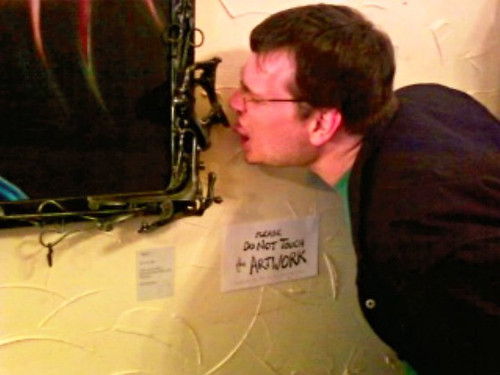“I don’t know art, but I know what I lick.”
– David Raffin
Writing
No Excuses
No Excuses
by David Raffin from the book Rhyme or Treason
Dear friend,
If ever I use you as a personal reference, please do not tell the interviewer about the time I burned down that orphanage.
If you do, at least have the decency not to tell them I laughed.
I do not think I am asking too much.
You know I had my reasons. While you understand that my heart is not hardened, you also surely understand my sense of fiscal responsibility. While I am not made of stone, neither am I made of gruel. When a child asks for more sometimes it is just too much for me.
I try to avoid all such issues completely during job interviews. I find it is best to focus on the positive. My track record. My accomplishments. My hobbies. I mean, I do tell them about the orphanage—I just don’t tell them I burned it down. And I certainly don’t tell them I laughed. All I’m asking is that you follow my lead. Back me up here.
If it comes up, when it comes up, I try to handle it to the best of my professional abilities. I wonder aloud who was really harmed by such an action. I mean in the big picture. I also pose the question: who was harmed more by my action, the children or me? Who’s sorrier now? On whose shoulders did the repercussions fall? I think we all know the answer to that.
Luckily I am more well suited to bear this burden than the children ever could’ve been, with my greater maturity and grander sense of purpose and civic duty.
Really. Just don’t tell them. It will work out better that way.
They are never happy to hear about it. You wouldn’t want to make someone, some stranger, unhappy for no real reason —would you?
Frankly that’s not the kind of person I thought you were. I know that’s not the kind of person I picture myself as.
[amazon asin=B002OHD220&template=iframe image]
Portland’s communist bench
Disclaimer: This article is about a communist plot.
Recently in Portland, OR I waited in line to sit on the communist bench. The bench is so popular, at least it was that day, I waited an hour and the man on it never left. He sat there, reading a newspaper, like he owned it. This might require revolution.
The problem is, there are not enough communist benches to go around.
This bench, which looks just like the other, empty, benches in Washington Park is communist simply because it is dedicated to Portland’s homegrown communist revolutionary, John Reed. Reed was a journalist who traveled the world covering war and strikes. When in Russia in 1917 he wrote a book about the Russian Revolution 10 Days that Shook the World. He returned to the USA and formed the first of two rival Communist parties in the USA, which soon merged.
The bench says little of this. It just says he was a writer and bears a quote about the beauty of the local area. It mentions his book but provides no context. It should bear a quote more in line with the spirit of Reed:
“All I know is that my happiness is built on the misery of others, so that I eat because others go hungry, that I am clothed when other people go almost naked through the frozen cities in winter; and that fact poisons me, disturbs my serenity, makes me write propaganda when I would rather play…”
Reed died in 1920 in the Soviet Union, at the age of 32, and is buried at the Kremlin Wall. The Multi-Oscar winning 1981 film Reds is about his life. Some of the action in my short story More Than One Day in the Life of Igor Igoravitch takes place “at the Kremlin wall, near the grave of John Reed.”
[See also A Taste of Justice by John Reed, a short article.]
Perils, Cesspools, Treason in Paperback
Perils of Free Thought (a book of no small danger) now available in paperback. Expanded text.
Scenic Cesspools (a tragi-comedy about work) now available in paperback.
[amazon asin=1490919112&template=iframe image] [amazon asin=1490915974&template=iframe image] [amazon asin=1470128403&template=iframe image]
Questions About Cake
by David Raffin | from Rhyme or Treason (hard fought illusion of choice)
Why are there no funeral cakes anymore? Why is this event not commoditized by the baker’s guild?
Cake is a standard at every other event. Did bakers find it was unwelcome to price gouge on the cake served at a funeral? When funeral cake was discontinued did the price of wedding cake rise?
I understand the Amish still serve funeral cake. They are set in their ways. They still mix it by hand. They make it themselves, bypassing the commercial bakeries altogether.
Was the cake discontinued for lack of choice? Did the mourned get to choose the color, shape, and flavor—stipulating such in a will or codicil, or were these choices thrust upon the mourned by a powerful subset of the mourners? Did someone finally wise up and say, “Who died and made you God?”
Did funeral cake enter disfavor when it was linked, intrinsically, with culinary fascism? Did Mussolini have a funeral cake? Was there enough for everybody? Is that what sullied its reputation the world over?
When Marie Antoinette famously said, “Let them eat cake!” was she talking about her funeral?
My research indicates that funeral cakes may have been somewhat akin to giant cookies. Presumably because it was disrespectful to let the flour rise.
What about funeral pie?
Are cream pies somber enough? Fruit? Pecan?
What about a funeral pudding?
Funeral cotton candy? Made at the funeral in a funeral cotton candy machine?
What about fondue? Which is more appropriate? Cheese, chocolate, coconut, honey, caramel, or marshmallow? Again, who will choose?
Milton Snavely Hershey’s body was dipped in chocolate, then caramel, then rolled in coconut. However, there was no dessert served at the reception. He forgot to leave his dessert instructions.
This is not the sort of thing people like to think about. That’s why people die without wills. That’s why people die with wills but failing to stipulate their final dessert wishes.
Today if you attend a funeral and you want cake you are best advised to keep it to yourself. If you stand and say, “Hey, where’s the cake!” people will think less of you.
Do not even think of sidestepping the problem by bringing a cake to the funeral. People may cry.
You don’t want to be known as the one who ruined the funeral.
[amazon asin=B002OHD220&template=iframe image] [amazon asin=B00ACMM1YE&template=iframe image]
A David Raffin Sampler is also a free download at http://davidraffin.com
Current Work in Progress Excerpt
It was nice in the clouds. But for the ear-splitting din. That terrible din. The sound of a horn resounding. Unrehearsed.
An angel approached another.
“Did you blow the vuvuzela horn?” asked the approaching angel.
“Not I!” said the angel holding the vuvuzela horn.
“You know if the horn blows it’s the beginning of the end.”
“How well I know! It’s a big thing to blow the horn. And you can’t practice because you can’t blow the horn. It’s so aggravating.”
“You blew the vuvuzela horn, didn’t you?”
“I did not. All I’m saying is, what will an unrehearsed horn do? No one really knows.”
“It will be the end of all things.”
“No, it will be the beginning of the end of all things. Who knows what form that will take?”
“I heard that horn blow.”
“We’re wasting a lot of time standing here arguing about who blew what.”
The approaching angel just stared at the other angel, who was still holding the horn.
“For the last time, I didn’t blow it.”
Scenic Cesspools
My book “Scenic Cesspools & other indignities” came out May 1.
Scenic Cesspools is the story of a kid who is pulled into his high school disciplinary office to be chastised for achieving some of the highest test scores in the school while still managing to almost flunk out. Upon graduation, there is nothing left but to venture into the workforce.
Working at a paper mill he discovers the industrial site is an alien landscape filled with green noxious liquids, held in open surface containers, outgassing into the atmosphere. It’s a place where death is as close as a misstep and the air smells a little like poison every day.
He learns that sales is a religion. A religion based on morning motivational meetings, chanting, and believing. If you are “money motivated” all you need do… is believe.
Leasing low income housing is difficult when your supervisors dislike poor people. Especially when they hate deaf people, because “deaf people make trouble.”
He learns there is nothing like selling flowers on the street from the back of a pickup; except selling perfume on the street from a cardboard box, or working for Ralph Nader.
Characters float in and out, sometimes challenging perceptions of time. They are obsessed with nuclear war in Vietnam, sex, Canadians, and unearned heroism.
[amazon asin=B00CJHGOJ8&template=iframe image]
The Time Traveler’s Wife
TTW: Where are you going?
TT: To kill Hitler.
TTW: You did that yesterday. I think you are avoiding me.
TT: No. I just like to kill Hitler.






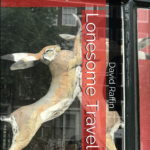
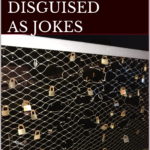





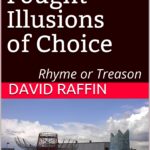
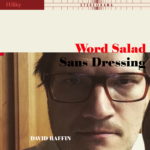
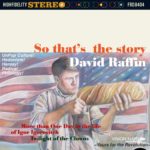

 RSS - Posts
RSS - Posts